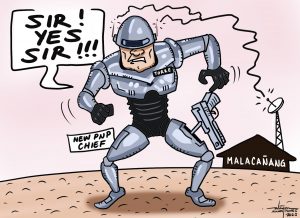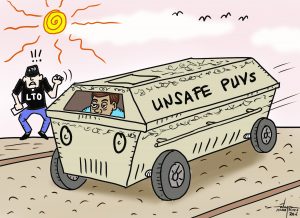A few days ago, we read in the local papers that the city government of Davao is planning to hire more parking attendants to assist vehicle owners in designated areas along certain city roads. These new personnel are also expected to collect for the city the prescribed parking fees.
The irony, however, is that while the parking attendants are to be increased, the roads intended for vehicle parking are disappearing. Even the stretches of certain city roads that used to be available for parking can no longer be found. These are either allocated as parking spaces for vehicles of establishment owners, or are designated as loading and unloading areas for passengers of public utility vehicles only.
So, the new parking fee collectors will have to collect from the drivers or owners of vehicles who could be the proprietors, personnel, or customers of nearby business establishments.
That means the city will be spending more for the wages of the soon-to-be hired parking attendants than what it could be earning from out of the parking fees that can be collected.
We believe that this is one move by the city that needs some critical re-thinking.
**********************
We agree with the observation of the City Social Services and Development Office (CSSDO) that there is a dwindling of indigenous people going down the lowlands to spend their Christmas holidays, specifically in downtown Davao City, asking for gifts or caroling.
Yes, it could really happen because the city government had come up with an effective way to make the IPs stay in their respective communities during the Christmas season. The city under the leadership of lady mayor Sara Duterte-Carpio has adopted a tweaked “If the mountain cannot go to Mohammad then let Mohammad go to the mountain instead” approach.
So, instead of letting the IPs come down to have their way of seeking gifts, it is now the city that goes to the mountain bringing gifts. Thus, our Lumad brothers are already assured that they can still have their “pinaskuhans” even if they will stay put in their mountain havens.
The scheme is also bringing the government closer to the Lumads who, admittedly, are the most neglected among the city’s population. For certain, the Lumads can feel the nearness of their officials and that despite the difference in their culture and that of the lowlanders such occasion as Christmas can bring them together as one people – the Davaoenos.
Besides, letting them (the Lumads) stay in their communities during the holiday season would keep them away from possible harm from being run over by irresponsible drivers.
The volume of vehicles using downtown Davao roads and the Lumads’ unfamiliarity with the ways of city life could easily put them in harm’s way.
They can also be gullible to the more scheming among the lowlanders who not only take advantage of the IPs’ ignorance of city life but also victimize them with their criminal ways.
With the apparent advantageous outcome of the current approach of the city government in dealing with the Lumads’ annual pilgrimage to the city, we are hoping that the scheme will be institutionalized. That is, that when a new administration takes over the approach will not anymore be set aside in favor of other strategies that are still untested.
We are also looking forward to the continued support of the program by the private sector, especially from the corporate groups.
We are very much aware that the bulk of the items brought to the uplands for the Lumads are donated by well-meaning corporations and individuals. And these sectors would not be hesitant to pool in more from their resources to help the city government bring joy to the Lumads in this season of giving.
Again, let the approach be institutionalized.


